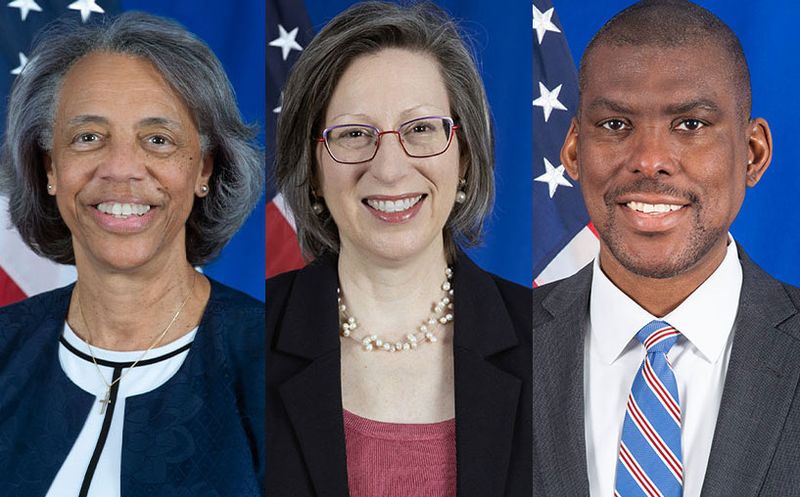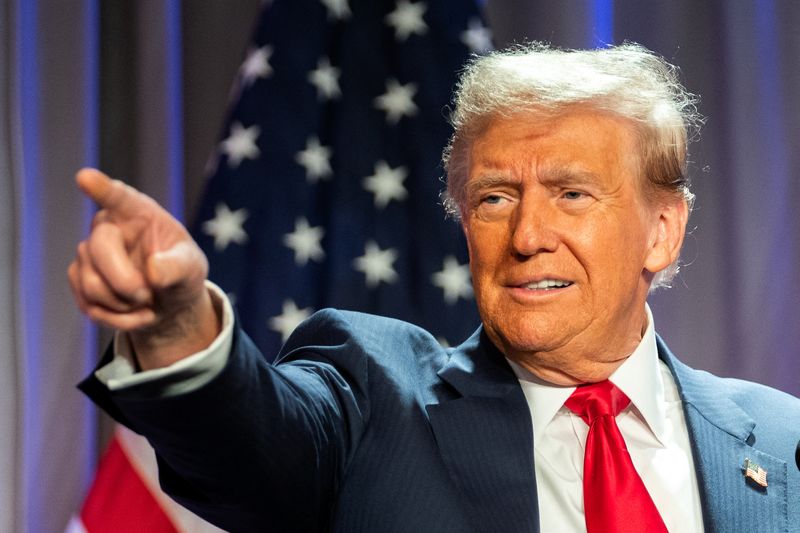By Humeyra Pamuk, Simon Lewis (JO:LEWJ) and Gram Slattery
WASHINGTON (Reuters) - Aides to President-elect Donald Trump have asked three senior career diplomats who oversee the U.S. State Department's workforce and internal coordination to step down from their roles, two U.S. officials familiar with the matter said, in a possible signal of deeper changes ahead for the diplomatic corps.
The team overseeing the State Department's transition to the new administration, the Agency Review Team, has requested that Dereck Hogan, Marcia Bernicat and Alaina Teplitz leave their posts, the sources said.
While political appointees typically submit their resignations when a new president takes office, most career foreign service officers continue from one administration to the next. All three officials have worked in both Democratic and Republican administrations throughout the years, including as ambassadors.
Trump, who will be inaugurated Jan. 20, pledged during his presidential campaign to "clean out the deep state" by firing bureaucrats that he deems as disloyal.
"There's a little bit of a concern that this might be setting the stage for something worse," one of the U.S. officials familiar with the matter said.
In response to a request for comment, a spokesperson for Trump's transition team said: "It is entirely appropriate for the transition to seek officials who share President Trump's vision for putting our nation and America's working men and women first. We have a lot of failures to fix and that requires a committed team focused on the same goals."
A State Department spokesperson said the department has no personnel announcements to make. Hogan, Bernicat, Teplitz did not respond to requests for comment.
Trump is likely to adopt a more confrontational foreign policy and has vowed to bring peace between Ukraine and Russia, and give more support to Israel. He has also pushed for unorthodox policies such as trying to make Greenland part of the United States and pushing NATO allies for higher defense spending. A diplomatic workforce that dutifully implements rather than pushes back will be key to achieving his goals, experts say.
The decision to ask the three to step aside is reminiscent of staff shake ups at the State Department during the first Trump administration, when several key officials in leadership positions were removed from their jobs.
According to two separate sources familiar with Trump's plans for the State Department, the administration plans to appoint more political appointees to positions such as assistant secretary, which are typically filled by a mix of career and political bureaucrats.
These sources said Trump's team wants to get more politically appointed officials deeper into the State Department as there was a pervasive feeling among his aides that his agenda was "derailed" by career diplomats during his last term from 2017 to 2021.
The Agency Review Team is already interviewing candidates for such positions, said the two sources.
According to the State Department website, Hogan is the State Department's executive secretary, the official that manages the flow of information between department bureaus and with the White House.
Bernicat is the director-general of the U.S. Foreign Service and director of global talent leading the recruitment, assignment, and career development of the Department's workforce.
Assistant Secretary Teplitz has been with the Department over three decades, serving overseas as well in Washington. Most recently, she has been implementing the duties of under secretary for management, which oversees more than a dozen bureaus responsible for issues from the budget to recruitment, procurement and human resources across the workforce.
"These are not policy positions. This is all the mechanics of the bureaucracy," said Dennis Jett, a professor at Penn State’s School of International Affairs who spent 28 years in the foreign service. "But if you want to control the bureaucracy, that's the way you do it."
Choosing who fills the three roles would allow Trump's team to divert resources to and from parts of the State Department, control the information gathered by the numerous bureaus and embassies and manage personnel decisions, he said.
SHATTERING THE 'DEEP STATE'
The requests for the officials to step down came as Marco Rubio, Trump's nominee for secretary of state, was testifying on Wednesday before the Senate Foreign Relations Committee for his confirmation hearing.
On his campaign website Trump laid out how, in 10 steps, he would "shatter deep state" and "fire rogue bureaucrats and career politicians".
The first of those steps is to reissue a 2020 executive order that would have removed employment protections for certain civil servants, making it easier to fire them.
Opponents of the plan - often called "Schedule F" after the new class of civil servants it would create - say stripping employment protections from government workers would be an effort by Trump to politicize the federal bureaucracy to carry out his policy agenda.
Normally, presidents get to choose several thousand of their own political appointees to the federal bureaucracy, but the career civil service - around two million workers - is left alone. Schedule F would give Trump the power to fire up to 50,000 of those and replace them with like-minded conservatives.

Taking charge of State's personnel would "expedite" the process of appointing loyal officials, said Jett, the professor.
Unions and government watchdogs have said they plan to sue Trump if he carries out his promise to re-introduce a Schedule F.
